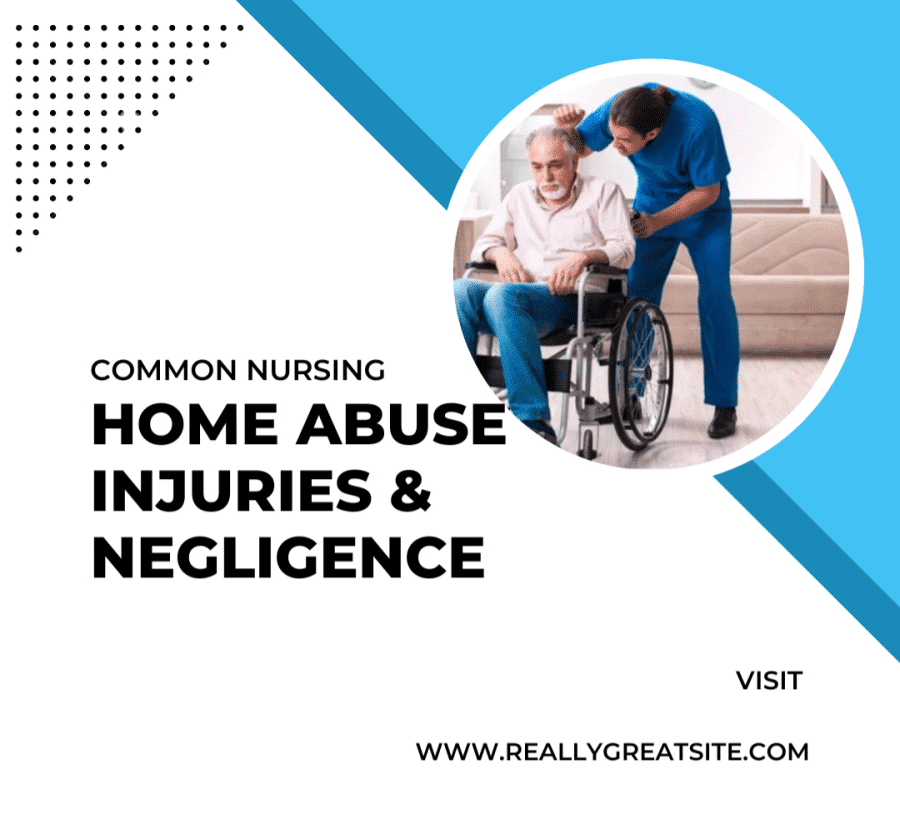Nursing home abuse injuries and negligence are a real problem, but it’s often difficult to spot. That’s because the signs may be hard to notice. It can take years for some of these injuries or neglectful care to become noticeable, and in that time, the victim can go from independent and functional to bedridden and dependent on others for their care. In some cases, the victim can even lose their life. It’s important to know what signs to look for so you can prevent your loved one from entering a nursing home or protect him from negligent care once he is in a facility. It’s sometimes hard to notice changes in a person’s behaviour, but it doesn’t take much to make a dangerous situation. If your loved one loses his independence and begins to lie in bed, gets incontinent and stops bathing, you should be concerned. If they also stop dressing or wearing their dentures, you should be further involved because the neglect may lead to severe dehydration or malnutrition.
These first signs can alert you that your loved one is receiving negligent care. However, you should be aware of more apparent symptoms. These include unexplained bruises, broken bones and sores that never seem to heal. Any evidence of pressure point injuries or skin tears should raise red flags because these are hallmarks of improper care. You will want to keep a close eye on your loved one after a nursing home injury as well because these injuries can quickly become severe or even fatal if left unchecked.
1. Broken Bones and Fractures:
This is a common sign of neglect or abuse, especially in older adults who are weaker than their younger counterparts. You should be able to spot a broken bone or fracture on your loved one’s body because it will be noticeable and can even reveal damage that was previously hidden by the victim’s clothing. And if you watch for redness or discolouration on the skin, you should also watch for signs of pressure point injuries. You will want to keep an eye on your loved one’s bones after a fracture or break because these injuries will not heal without proper treatment.
2. Lacerations:
Lacerations are another injury that can become serious, but they are often treated by neglectful nursing homes. It would help if you watched for sores that never seem to heal or unexplained wounds, and any sign of a skin tear should be cause for concern. You will also want to watch for signs of exposure to feces or urine because those fluids can damage the skin. The fact that your loved one has a laceration also means they may be at risk for severe infection, so you should keep a close eye on them.
3. Infections:
If your loved one develops wounds or cuts that do not heal, your first instinct may be to think that the damage was sustained in a fall. But it’s important to remember that even minor cuts could be infected, so you should keep an eye on your loved one’s wounds and listen for signs of infection. You will also want to watch for signs that they are drinking too much water, which could be another sign of neglect.
4. Bedsores:
Bedsores are one of the most common and severe nursing home abuse injuries. These sores develop when the victim is left in improper positions for too long, suffering pressure on particular parts of their body that become injured. Bedsore can lead to infection and even gangrene, so it’s essential to look for signs of this problem as soon as possible. You will want to watch for wounds that don’t heal and skin discolouration in the area where your loved one lies.
5. Burns:
Burns is another severe injury that can lead to infection and complications, so you will want to watch for signs of burns on your loved one. These signs include redness, swelling and pain in the area where the burn occurred. And if your loved one was not burned accidentally, then they are likely receiving abusive care from nursing home staff.
6. Pressure Point Injuries:
Pressure point injuries are another hallmark of nursing home neglect. These injuries can develop when your loved one suffers from improper care, which can be severe. You will want to keep an eye on your loved one after pressure point injuries form to ensure they receive proper medical treatment immediately. If you suspect that your loved one may have received abusive care, take a closer look at the things they cannot do as well as signs of pressure points that might have been overlooked by nurses or caregivers.
If you suspect nursing home abuse, it is essential to take action immediately. Contacting a nursing home abuse lawyer can help you understand your legal options and pursue a claim against the abuser.
Conclusion:
These signs of neglect can be tough to detect, but you can increase your chances of spotting them by keeping an eye on your loved one after a nursing home injury. You should also keep tabs on your loved one’s temperature and weight because these can be indicators of dehydration or malnutrition as well. If you spot any of these signs, it would be wise to seek medical attention immediately for your loved one, so they don’t suffer severe consequences.





